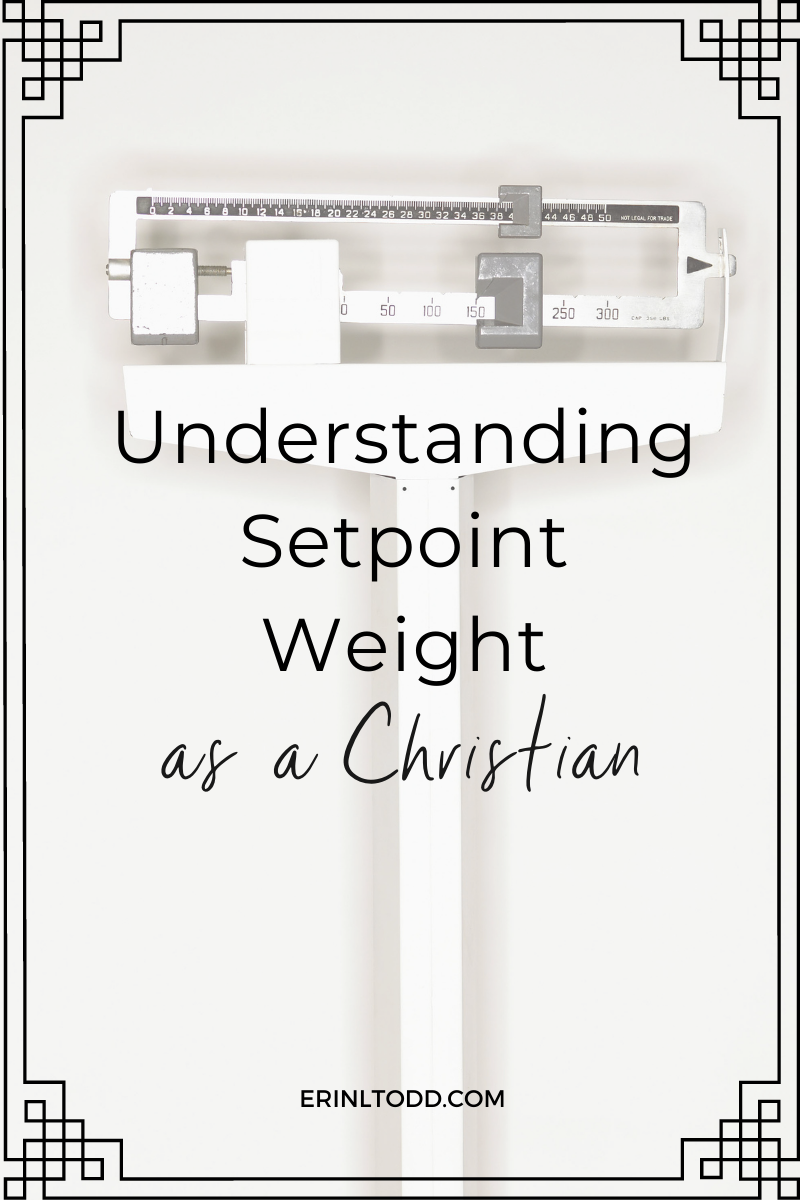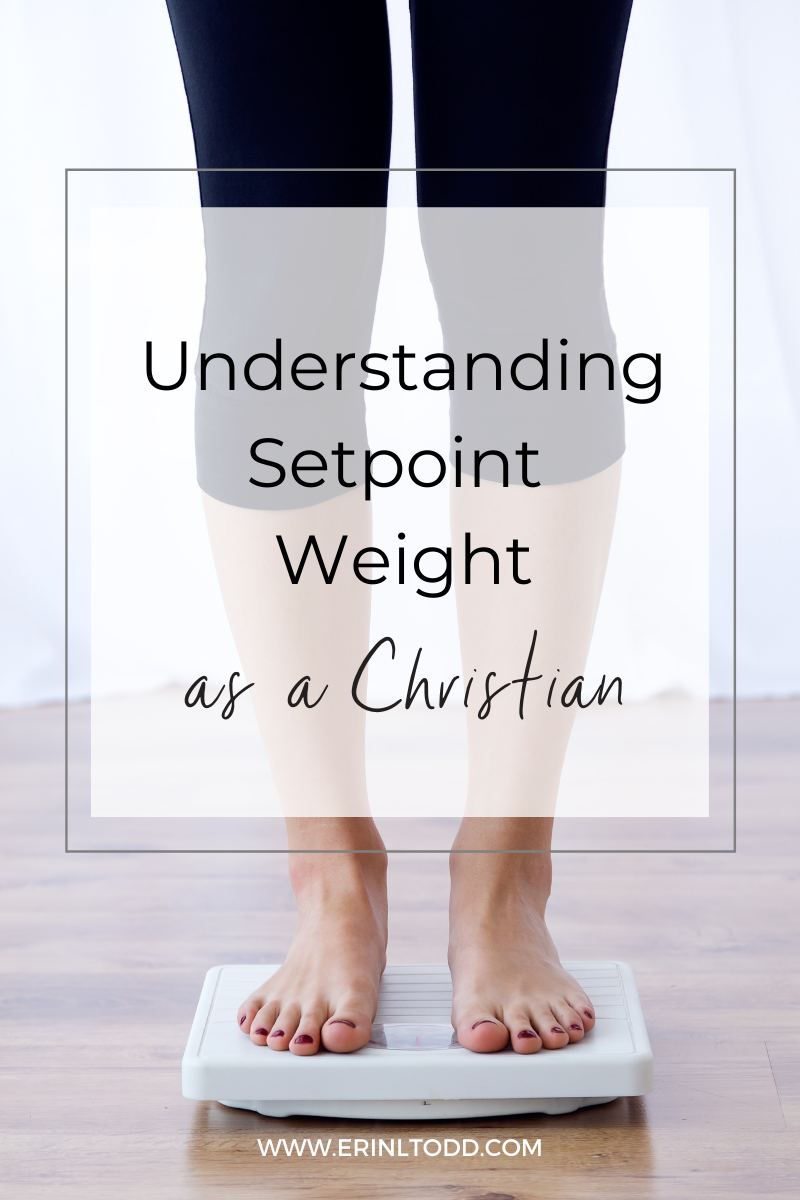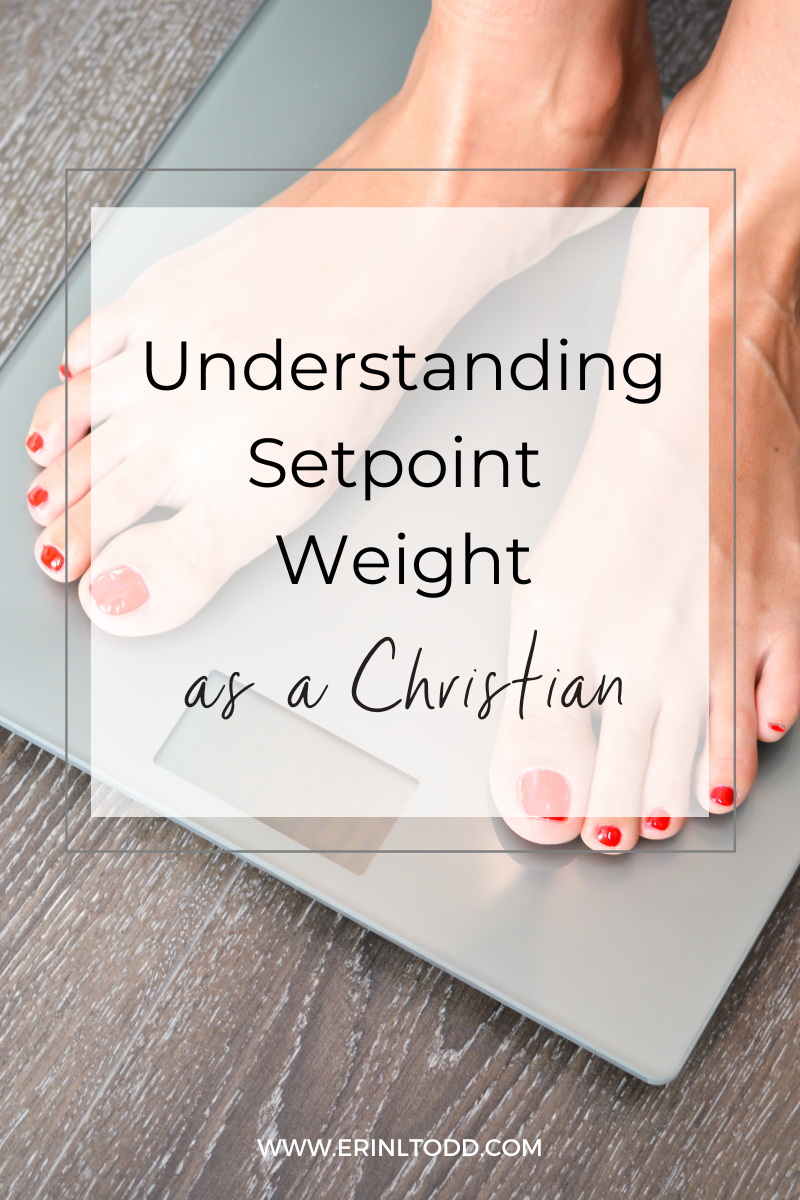Understanding setpoint weight as a Christian
What is my setpoint weight? What if I want to change my setpoint weight? What does this mean for me as a Christian woman? In this post I’ll explain setpoint weight theory and its implications for faith-based intuitive eating.
God’s design of the human body includes an intricate weight regulation mechanism that works behind the scenes without conscious thought from you.
Just like breathing and digestion, your incredible body systems can regulate themselves to maintain homeostasis (think healthy balance or status quo) throughout your body. What an incredible design!
But these incredible body systems only work when we allow them to work.
The problem is so many of us have tried to interfere and take control of our bodies instead of letting them just be as they are. We’ve essentially broken our bodies’ weight regulation mechanism by dieting.

If you’ve ever struggled with weight-cycling (aka yo-yo dieting), learning about setpoint theory will help you understand why dieting failed you.
That’s right, I said dieting failed YOU! You are not the failure.
More importantly, learning about setpoint theory will help you understand God’s design of the body and help you begin to accept the setpoint weight God created for you.
What is my setpoint weight?
I had never heard of setpoint weight until I read the book Health At Every Size® by Linda Bacon PhD (a must read on my recommended reading list).
Chapters 1 & 3 of the book helped me to understand the science behind setpoint weight theory. This book does an amazing job of breaking down research studies in an easy to understand way that helped things to click for me.
This gave the scientific explanation for what I had experienced in my own dieting history. Despite multiple efforts to get extreme across many years of coming in and out of dieting, my body always seemed to go back to a particular size when left to its own devices.
When I took my white-knuckle grip off the steering wheel, my body would take me back to where it was meant to be. That’s my setpoint!
“Setpoint” is defined in the book Health At Every Size® as follows:
- “the level that is biologically ideal for us” (p. 12)
- “The healthy weight that your body aims for is called your setpoint weight. (p. 13)
- “More than fifty years of research proves that your body tries to maintain your fat at the level at which you are designed to function best.” (p. 14)
- “The weight you maintain when you listen and respond to your body’s signals of hunger and fullness” (p. 19)
- “The weight you maintain when you don’t fixate on your weight or food habits.” (p. 19)
- “The weight you keep returning to between diets.” (p. 19)
- “Fat homeostasis, or your own setpoint.” (p. 19)
- “How much fat protection your body requires (your setpoint) is the result of a complex interplay of genetics and the lifestyle choices made today as well as in the past – and is intimately linked to your current weight.” (p. 27)
- “Natural setpoint, the weight that is healthiest for you” (p. 29)
Your setpoint weight is actually a range
I think it’s important to note that the word setpoint seems to imply there is one particular point, or one magic number for your weight. But the target is not that small. Your setpoint weight is actually a range of about ten to twenty pounds.
That means there is a 10-20 lb range that is your body’s happy place. Your body is comfortable within this setpoint range because that is where it was designed to be.
For me, this setpoint range feels balanced and effortless. Losing or gaining small amounts of weight in this range is not difficult and won’t trigger your body’s compensatory responses to bring you back into homeostasis because you’re already there!
How dieting affects your setpoint weight
Picture your setpoint weight as a fat thermostat.
God created us and He set our thermostat to the point that is most comfortable and best for us. Our body systems are constantly working to keep our body in alignment with that point.
God’s design for us is a powerful force on our bodies and the further you go away from that special thermostat setting, your body will kick into overdrive to bring you back to the comfortable range.
So if we decide we are not happy with our God-given thermostat setting and we start messing with that setting by dieting, our weight-regulation mechanism starts to break down.
I’ll confess that in my disordered eating days, I turned the dial down so far it basically iced out my system which froze and broke!
Our bodies are designed to be efficient at energy conservation. This is meant to keep us alive during famine. That’s a good thing!
In this modern age of abundance and easy access to food, most of us will never experience a real famine. But when we cut our food consumption down to nearly nothing while on a diet, our bodies think we’re in a famine.
Our bodies can’t tell that we’ve chosen to starve ourselves by dieting and think we’re actually starving. So our body systems kick into high gear to try and keep us alive and get us back to our setpoint.
Remember, our bodies like to maintain the status quo.
The book Health At Every Size® sums it up so well:
Health At Every Size:
“Your body strongly protects against dipping below your setpoint, though most people’s bodies are relatively less aggressive at preventing them from rising above their setpoint. In other words, weight gain is relatively easy at the same time that weight loss may not be possible. When you lose weight and threaten this system, your body may react by raising your setpoint, protecting against future threat.”
(p. 26-27)
Many of chronic dieters have experienced this weight-regulation mechanism at work. When we lose body fat, the loss of fat triggers the body’s mechanisms to reclaim it. As soon as we go off the diet, all the weight comes back and usually then some. This is our body resetting our setpoint to a higher level.
This is where we should be saying, thank you body for this extra level of protection to help me survive the next diet/famine!
But we don’t see it that way, do we?
The irony is many of us chronic dieters tend to be heavier than those who haven’t attempted weight loss in the first place.
Some of you perfectionists might be thinking you can solve this by just NOT going off the diet.
I know I did… If I just stay on the diet and follow it to the letter, I won’t regain the weight, right?
Wrong!
This was the shocker to me, especially with all the diet culture lies swirling around about “willpower”.
I had to live this for myself to fully understand, but if you’d like to take an expert’s word for it Ch. 3 of Health At Every Size® does a great job of explaining this seeming contradiction of how we could possibly eat less and weigh more.

By unpacking the Women’s Health Initiative Study we get the full picture of dieters who lost weight at the beginning but gained it back.
“Commentators often attribute weight regain to people’s inability to maintain their diets over the long run: the old “no willpower” problem. Yet this study was well controlled to support the women in maintaining their diets. Weight regain occurred despite maintaining their reduced-calorie diet!” (p. 48)
So even when we stick to the diet our bodies will fight back with weight regain.
Our bodies are just not designed to support weight loss.
When we try to force weight loss through dieting, it not only doesn’t work (the weight loss does not last) we may cause our bodies to compensate and push our setpoint weight UP!
Understanding setpoint weight as a Christian
So what does all this setpoint theory mean for us as Christian women?
God designed our bodies intricately, wonderfully.
For you created my inmost being; you knit me together in my mother’s womb. I praise you because I am fearfully and wonderfully made; your works are wonderful, I know that full well.
Psalm 139:13-14
His design – when followed – sets us up for homeostasis, a happy place, our set point.
This is a natural, comfortable, effortless place where our body can do all the work and regulating for us and all we have to do is listen to our body and trust it.
We can trust our bodies because God made them. We trust God. It is a good design.
When we resist or fight or try to take control away from God’s design by dieting, we disrupt the balance with our body systems and our alignment with God.
We have to understand and accept that God’s design for the human body is that weight gain is relatively easy but weight loss is not.
The human body was not made to support weight loss. This is not a bad thing. This is meant to keep us alive.
God cares that we’re alive, surviving famine, not about our weight.
God designed our weight as a hands-off system so we need to keep our hands off!
We need to quit trying to tinker with and “improve” God’s design to conform with worldly standards of beauty.
We need to let our bodies work and accept whatever set point the Lord gave us.
Find and accept your setpoint weight
You can find your setpoint by listening to your body and eating intuitively. Taking a faith-based approach to intuitive eating helps us to not only find our setpoint weight but also learn to accept that weight, even if we don’t like it.
When we begin to trust and honor the weight-regulation system that God created inside us, we begin to heal our relationship with food, body and our Creator.

Learn more about Health at Every Size®
If you want to learn more about a faith-focused, weight-neutral way to pursue whole health for your mind, body and soul, then check out our podcast Intuitive Eating for Christian Women – that’s what we’re all about!
And if this inspired you to finally want to really dig in, learn more about Health At Every Size® and understand the science behind why dieting doesn’t work (and what to do instead!) then I’ve got more great resources for you:
This last resource might be my favorite! There’s no substitute for reading this seminal book for yourself and thinking through what that means for YOUR health and faith. But you don’t have to do it alone! Come join our podcast monthly membership program to access the Virtual Book Club for Health at Every Size®
Even if you didn’t catch the live version we did as a community over the summer of 2021, the content is still there and available for you to go through at your own pace. All you need is your own copy of the book Health At Every Size by Dr. Linda Bacon (get wherever you buy books).
What the Virtual Book Club includes:
- Reading plan for 1 chapter a week (but you can go at your own pace since it’s not live)
- Chapter summaries with key quotes information to focus on
- Reflection questions for each chapter
- A video from us – the Intuitive Eating for Christian Women podcast co-hosts – unpacking the chapter (ranging from 15-40 minutes depending on the complexity of the chapter) specifically from a faith-based perspective
- Access to the Zoom recording of the book club finale, Q&A session
We had so much fun doing this Virtual Book Club! Understanding HAES and applying this information to how we approach food and how we live out our faith is SO important! Don’t miss this incredible resource!
Learn More in Our Virtual Book Club
Support the podcast and join the book club in our Membership Site

